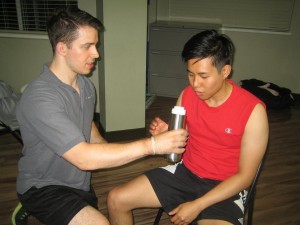Rinse Your Hands
- Rinse your hands carefully with soap and warm water, and dry them before managing food, after touching raw foods – as well as vegetables, eggs, fish and meat – and after touching the garbage can, using the toilet, blowing your nose, or handling pets.
Wash Counters
- Wash counters prior and after preparing food, mainly after they’ve been touched by uncooked meat, including fish, vegetables, poultry and raw eggs.
- You don’t have to use antiseptic sprays: warm, soapy water is adequate.

Drink lots of water when suffering from food poisoning
Wash Dishrags
- Wash dishrags and tea towels frequently and let them dry prior to using them again.
- Unclean, clammy cloths are the ideal place for microorganisms to breed.
Use Different Chopping Boards
- Use different chopping boards for uncooked food and food that is already cooked.
- Uncooked foods can contain dangerous bacteria that spreads very quickly with anything they touch.
Keep Uncooked Meat Isolated
- It’s particularly important to keep uncooked meat away from other foods, such as bread, fruit and salads.
- This is due to the fact that these foods won’t be heated before you consume them, so any bacteria on these foods won’t be killed.
Store Uncooked Meat On The Bottom Shelf
- Always cover uncooked meat and keep it on the lowest shelf of the fridge, so it can’t touch other foods.
Cook Food Carefully
- Cook food carefully and look to see that it’s hot all the way through.
- Make certain poultry, sausages, burgers and kebabs are prepared until scorching hot, with no visible signs of pink meat.
- Don’t rinse uncooked meat including poultry and turkey prior to cooking, as this increases the risk of bacteria. Carefully cooking the meat will eradicate all existing bacteria.
Look For ‘use by’ Dates
- Don’t consume food that’s past its expiry date even if it seems and smells acceptable.
- Expiry dates are founded on systematic tests that show how fast harmful bugs can advance in the packaged food.
Related Video On Food Poisoning
